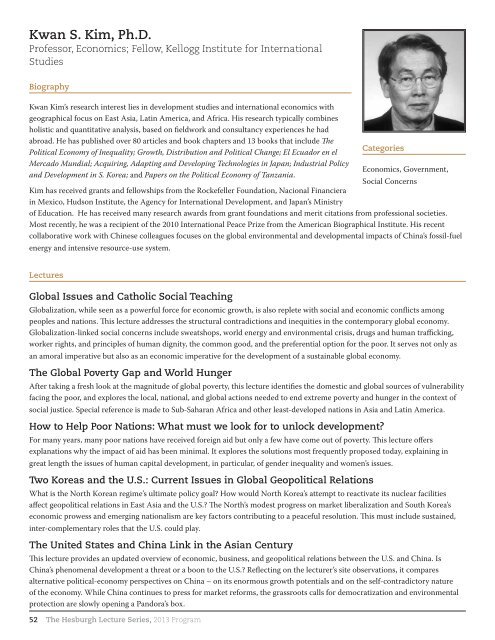HESBURGH LECTURE SERIES 2013 Program - Alumni Association ...
HESBURGH LECTURE SERIES 2013 Program - Alumni Association ...
HESBURGH LECTURE SERIES 2013 Program - Alumni Association ...
Create successful ePaper yourself
Turn your PDF publications into a flip-book with our unique Google optimized e-Paper software.
Kwan S. Kim, Ph.D.<br />
Professor, Economics; Fellow, Kellogg Institute for International<br />
Studies<br />
Biography<br />
Kwan Kim’s research interest lies in development studies and international economics with<br />
geographical focus on East Asia, Latin America, and Africa. His research typically combines<br />
holistic and quantitative analysis, based on fieldwork and consultancy experiences he had<br />
abroad. He has published over 80 articles and book chapters and 13 books that include The<br />
Political Economy of Inequality; Growth, Distribution and Political Change; El Ecuador en el<br />
Mercado Mundial; Acquiring, Adapting and Developing Technologies in Japan; Industrial Policy<br />
and Development in S. Korea; and Papers on the Political Economy of Tanzania.<br />
Kim has received grants and fellowships from the Rockefeller Foundation, Nacional Financiera<br />
in Mexico, Hudson Institute, the Agency for International Development, and Japan’s Ministry<br />
of Education. He has received many research awards from grant foundations and merit citations from professional societies.<br />
Most recently, he was a recipient of the 2010 International Peace Prize from the American Biographical Institute. His recent<br />
collaborative work with Chinese colleagues focuses on the global environmental and developmental impacts of China’s fossil-fuel<br />
energy and intensive resource-use system.<br />
Lectures<br />
Global Issues and Catholic Social Teaching<br />
Globalization, while seen as a powerful force for economic growth, is also replete with social and economic conflicts among<br />
peoples and nations. This lecture addresses the structural contradictions and inequities in the contemporary global economy.<br />
Globalization-linked social concerns include sweatshops, world energy and environmental crisis, drugs and human trafficking,<br />
worker rights, and principles of human dignity, the common good, and the preferential option for the poor. It serves not only as<br />
an amoral imperative but also as an economic imperative for the development of a sustainable global economy.<br />
The Global Poverty Gap and World Hunger<br />
After taking a fresh look at the magnitude of global poverty, this lecture identifies the domestic and global sources of vulnerability<br />
facing the poor, and explores the local, national, and global actions needed to end extreme poverty and hunger in the context of<br />
social justice. Special reference is made to Sub-Saharan Africa and other least-developed nations in Asia and Latin America.<br />
How to Help Poor Nations: What must we look for to unlock development?<br />
For many years, many poor nations have received foreign aid but only a few have come out of poverty. This lecture offers<br />
explanations why the impact of aid has been minimal. It explores the solutions most frequently proposed today, explaining in<br />
great length the issues of human capital development, in particular, of gender inequality and women’s issues.<br />
Two Koreas and the U.S.: Current Issues in Global Geopolitical Relations<br />
What is the North Korean regime’s ultimate policy goal? How would North Korea’s attempt to reactivate its nuclear facilities<br />
affect geopolitical relations in East Asia and the U.S.? The North’s modest progress on market liberalization and South Korea’s<br />
economic prowess and emerging nationalism are key factors contributing to a peaceful resolution. This must include sustained,<br />
inter-complementary roles that the U.S. could play.<br />
The United States and China Link in the Asian Century<br />
This lecture provides an updated overview of economic, business, and geopolitical relations between the U.S. and China. Is<br />
China’s phenomenal development a threat or a boon to the U.S.? Reflecting on the lecturer’s site observations, it compares<br />
alternative political-economy perspectives on China – on its enormous growth potentials and on the self-contradictory nature<br />
of the economy. While China continues to press for market reforms, the grassroots calls for democratization and environmental<br />
protection are slowly opening a Pandora’s box.<br />
52 The Hesburgh Lecture Series, <strong>2013</strong> <strong>Program</strong><br />
Categories<br />
Economics, Government,<br />
Social Concerns



